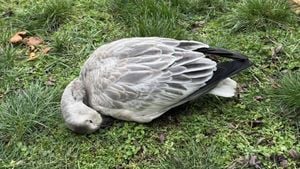South Korea is ramping up its international engagements as it signed significant agreements recently, reflecting the nation’s growth ambitions on the global economic stage. On November 13, 2024, South Korea solidified its strategic collaboration with Poland, aiming to deepen financial ties and facilitate the entry of South Korean banks and companies within the Eastern European market.
This memorandum of cooperation, signed at the Financial Services Commission (FSC) headquarters in Seoul by the commission’s head, Kim, is focused on fostering greater financial collaboration not just between banks but also extending through insurance and other sectors. The goal is clear: to aid more than 370 South Korean firms currently operating in Poland, which collectively have invested around $6 billion. Kim emphasized the need for Polish support to help navigate the local banking environment and to secure funding for these firms, bolstering their operations across borders.
Poland, as South Korea's largest trading partner within Central and Eastern Europe, has seen bilateral trade flourish, hitting highs of $10.1 billion last year. This trade has been on the upswing, marking six years of consistent growth. Significant deals have also taken place, highlighting the military collaboration, such as Poland's procurement of advanced military hardware from South Korea, including K2 tanks and FA-50 light aircraft, reflecting security dynamics prompted by the current military climate between Russia and Ukraine.
Interestingly, this move isn’t solely about financial transactions; it encapsulates broader economic relations, where the memorandum allows South Korea to solidify its presence within Poland, encouraging local investments too. The agreement, by extending beyond mere banking, opens up avenues for South Korean insurance firms to operate within Poland, which is increasingly becoming a stable economic hub within Europe.
On another front, South Korea is also focusing on bolstering its agricultural sector through efforts to support young farmers. The Ministry of Agriculture, Food and Rural Affairs, announced on the same day, intends to expand its grant program aimed at young and beginning farmers as part of broader countryside development initiatives. Since its inception in 2018, this initiative has aimed to ease the burdens faced by new farmers entering the field, especially during challenging start-up periods.
The grant program, which provides financial support up to 1.1 million won (around $780) monthly for up to three years, plans to grow its recipient list significantly—from 5,000 expected by the end of 2024 to 23,000 by 2025. This expansion reflects South Korea’s recognition of the increasing number of young adults, particularly those without traditional agricultural backgrounds, turning to farming as a viable career choice.
The statistics are telling. The proportion of new farmers without prior farming experience has surged from 42.5% to 78.3% over the last six years. Likewise, the interest from urban youths seems palpable; most young grant recipients are transitioning from city life to agricultural endeavors, shedding light on changing perspectives about farming careers. Notably, the share of female participants has leaped from 17.5% to 29.6%, indicating not just economic opportunities but shifts toward inclusive agricultural practices.
South Korea's proactive approach highlights the dynamic adjustments made to address its developmental priorities. By seeking partnerships abroad and enhancing local agricultural policies, it showcases versatility amid shifting global economic landscapes. The recent agreements with Poland and the commitment to fund aspiring farmers together tell the story of a nation striving not just for growth but also for resilience and sustainability.
Such steps are pivotal as global market dynamics evolve rapidly. The successful implementation of these initiatives adequately reflects South Korea's strategy to build networks—across sectors and geographies—enabling not just economic stability but also innovation and growth.



